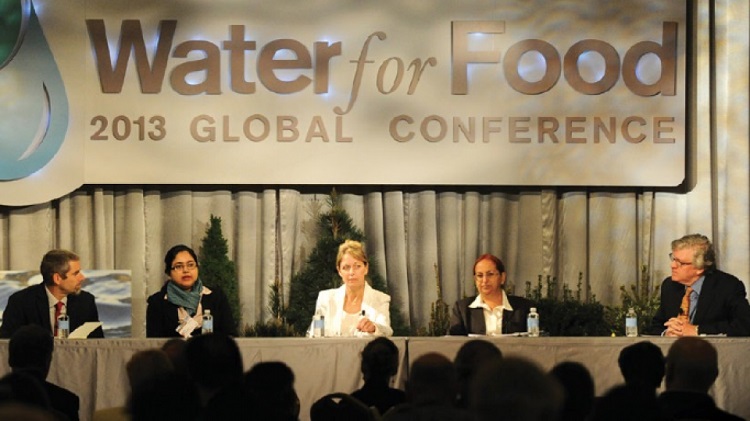
Mobilizing new data gathering capabilities to improve global water and food security is the subject of the sixth annual Water for Food Global Conference hosted by the Robert B. Daugherty Water for Food Institute at the University of Nebraska in association with the Bill & Melinda Gates Foundation.
The conference will take place Oct. 19-22 in Seattle.
The event is the premiere gathering of world experts working to develop new approaches to produce more food with less pressure on water resources. It brings together researchers and policy analysts, farmers, government leaders, and non-governmental organization and business representatives.
Remote sensing, precision agriculture, GPS services, satellite imagery and the supercomputing power to analyze the tsunami of data available are transforming agricultural and water management.
This year's conference theme, "Harnessing the Data Revolution: Ensuring Water and Food Security from Field to Global Scales," will provide a forum for global experts and policy leaders to discuss ways to effectively manage and use data-gathering technology to conserve water and improve crop yields for farming systems, large and small, around the world.
“The explosion of data in recent years is having a significant impact on virtually every field of human endeavor. New and complex sets of data, from smart phone communications to remote sensing, are opening up new possibilities for better data-driven analysis and decision-making,” said Roberto Lenton, founding executive director of the Robert B. Daugherty Water for Food Institute at the University of Nebraska. “If effectively harnessed, the data revolution presents significant opportunities to help ensure food and water security. However, it also introduces challenges. For example, enabling more farmers to use data effectively to improve their operations requires training and agricultural extension, which will be especially challenging in those countries where these services are already limited. We’ll explore all sides of the role of data in ensuring water and agricultural sustainability at this year’s event.”
Presentations and panel discussions will cover a range of topics, including the data needs of smallholder farmers, using climate data to improve decision-making, water’s effect on public health, and the policy and economic implications of water metering.
Speakers will include:
• Jeremy Bird, director general of the International Water Management Institute
• Kenneth G. Cassman, University of Nebraska-Lincoln agronomist and leader of the Global Yield Gap and Water Productivity Atlas
• Robert T. Fraley, executive vice president and chief technology officer of Monsanto Co.
• Peter Gleick, president of the Pacific Institute and a leading voice on global water and climate issues
• Jeff Raikes, co-founder of the Raikes Foundation and former CEO of the Gates Foundation
• Frank Rijsberman, CEO of the CGIAR Consortium
For additional information on the 2014 Water for Food Global Conference, including how to register, visit: http://waterforfood.nebraska.edu/wff2014. Daily conference blog updates and live web-streaming of select presentations will also be available on the website.
Complimentary conference registration is available to qualified professional journalists who are covering the conference for recognized print, online and broadcast news organizations. For more details, media professionals may contact Molly C. Nance at mnance@nebraska.edu or 402-472-5512.
Founded in 2010, the Robert B. Daugherty Water for Food Institute at the University of Nebraska is a research, education and policy analysis institute created to address the global challenge of achieving food security with less pressure on water resources through improved management of water in agricultural and food systems. The institute is committed to ensuring a water and food secure world without compromising the use of water for other human and environmental needs. Learn more at http://waterforfood.nebraska.edu/.
More details at: http://go.unl.edu/x5c8